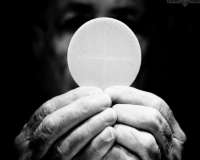
Concerning the Feast of Mercy Jesus said:
Whoever approaches the Fountain of Life on this day will be granted complete forgiveness of sins and punishment. (Diary 300)
This Feast emerged from the very depths of My mercy, and it is confirmed in the vast depths of my tender mercies. (Diary 420)
On one occasion, I heard these words: My daughter, tell the whole world about My Inconceivable mercy. I desire that the Feast of Mercy be a refuge and shelter for all souls, and especially for poor sinners. On that day the very depths of My tender mercy are open. I pour out a whole ocean of graces upon those souls who approach the fount of My mercy. The soul that will go to Confession and receive Holy Communion shall obtain complete forgiveness of sins and punishment.* [our emphasis] On that day all the divine floodgates through which grace flow are opened. Let no soul fear to draw near to Me, even though its sins be as scarlet. My mercy is so great that no mind, be it of man or of angel, will be able to fathom it throughout all eternity.
I want to grant complete pardon to the souls that will go to Confession and receive Holy Communion on the Feast of My mercy. (Diary 1109)
Concerning the Feast of Mercy Jesus said: Whoever approaches the Fountain of Life on this day will be granted complete forgiveness of sins and punishment. (Diary 300) I want the image solemnly blessed on the first Sunday after Easter, and I want it to be venerated publicly so that every soul may know about it. (Diary 341) This Feast emerged from the very depths of My mercy, and it is confirmed in the vast depths of my tender mercies. (Diary 420)
I want to grant complete pardon to the souls that will go to Confession and receive Holy Communion on the Feast of My mercy. (Diary 1109)
Jesus asked that the Feast of the Divine Mercy be preceded by a Novena to the divine Mercy which would begin on the Holy Friday. He gave an intention to pray for each day of the Novena.
In her diary, St. Faustina wrote that Jesus told her:
On each day of the Novena you will bring to My heart a different group of souls and you will immerse them in this ocean of My mercy On each day you will beg My Father, on the strength of My passion, for the graces for these souls.
Sara Giudizi

























